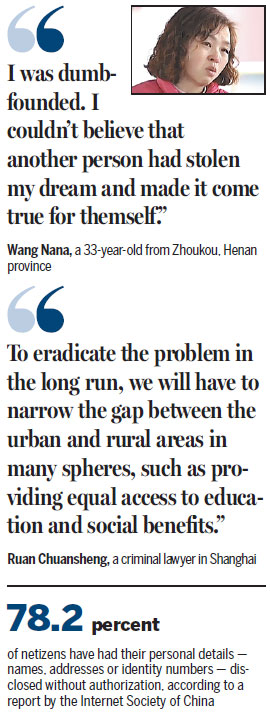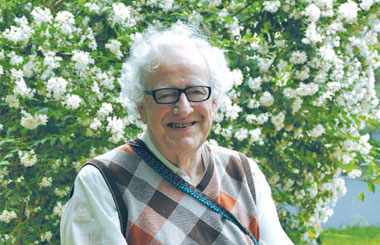China tackles growing identity crisis
Updated: 2016-05-25 07:54
By Cao Yin in Beijing and Qi Xin in Zhengzhou(China Daily)
|
|||||||||
The authorities are working to eradicate duplication of official documents after two well-publicized cases highlighted a rising problem, report Cao Yin in Beijing and Qi Xin in Zhengzhou, Henan province.
Thirty provinces, municipalities and autonomous regions are understood to be setting up a system to prevent identity theft in China. Although no details have yet been released, the system will ensure that the information given to authorities is accurate and that identity cards and hukou, or household registration certificates, match the named owners, according to the Ministry of Public Security.
Keeping identity-related information secure has become a problem in China. In a report published in July, the Internet Society of China said 78.2 percent of netizens have had their personal details - names, addresses or identity numbers - disclosed without authorization.
The authorities are now acting to tighten up the system in the wake of two well-publicized cases that made national headlines after it was revealed that one woman's college place had been taken by an imposter, while another discovered that she had had no legal status, and therefore no access to benefits, for six years.
A traumatic year

Wang Nana said the past year has been the most traumatic of her life, leaving her panic-stricken and with little hope.
The problem began when the 33-year-old from Zhoukou, a city in the central province of Henan, applied for a bank loan. Her application was refused after the bank ran a credit check that suggested she had submitted inaccurate information on the loan form.
The mystery was solved when Wang discovered that someone else was using her identity, and had even taken her place at college in 2003.
According to the bank's credit check, Wang had graduated from the Zhoukou Vocational and Technical College in 2006, even though she had never attended the school.
"I was dumbfounded. I couldn't believe that another person had stolen my dream and made it come true for themself. I wanted an explanation," said Wang, who runs a photocopying outlet in her hometown.
Liu Hongli, also from Zhoukou, was shocked to find that her hukou and identity card had been registered in Beijing without her knowledge, and that the police had failed to alert her to the fact her hukou had been nullified in 2010.
"In other words, I have been a 'black householder' (an illegal resident) for six years," the 35-year-old said.
Wang and Liu spent many hours traveling back and forth between their local public security bureau and related government offices to prove their identities, but now, both have some sort of closure.
In Wang's case, three people suspected of fabricating fake identity certificates have been detained while investigations continue. Meanwhile, Liu obtained a new hukou at the beginning of the month, and her case is also being investigated.
Legal professionals said that the cases were just the tip of an iceberg made possible by the country's poor management of identity security.
Although it is just a small piece of paper, the hukou certificate is far more than just proof of residence because it details a person's marital status, eligibility for unemployment benefit, health service status, education opportunities and pension. As such the hukou and an ID card are the most important documents in a Chinese citizen's life.
Moreover, experts say there is a huge difference between the benefits bestowed by rural and urban residence permits - for example, unemployment benefit is lower in rural areas.
The problem of identity theft has fluctuated in recent years. In 2009, nearly 1.7 million people possessed duplicate hukou certificates. In 2013, the police canceled 790,000 fake certificates. The number soared to 2.5 million in 2014, but by March last year, it had fallen to 486, according to statistics released by the ministry in December.
Ruan Chuansheng, a criminal lawyer in Shanghai, said that the fabrication of identities will only be eradicated through stricter law enforcement by public security departments and government offices.
An uneventful life
Wang lived an uneventful life until she discovered that someone had stolen her identity and taken her place at college.
"I was very depressed when I was told that I had 'failed' the college entrance exam, but I got over it. I got married, looked for a job and had children," she said. "My mind went blank when the bank clerk told me that there was something wrong with my identity papers."
In fact, Wang had passed the college entrance exam, but the letter offering her a place at university in 2003 was intercepted by the father of another student, a girl called Zhang Yingying, who then attended college under Wang's name. When she graduated Zhang was presented with a certificate that carried her photo but showed Wang's name and ID number. After graduation, she landed a job as a teacher at a vocational school.
When the Zhoukou police investigated the case, they discovered that Wang's enrollment letter had not been delivered to her home in the city's Shenqiu county, but had instead been handed over to Zhang's father in nearby Shangshui county.
When the investigators uncovered the fact that Zhang had failed the college entrance exam in 2003, her father, Zhang Heting, confessed that he had bribed the teacher in charge of mailing enrollment letters to obtain Wang's. He then bribed police officers to obtain a fake ID card and hukou for his daughter.
Now, 13 people alleged to have been involved in the case have been detained, and three of them - those said to have fabricated false hukou certificates - are under further investigation.

Despite her relief, Wang was still dissatisfied. "I left my home address and phone number with the public security bureau in 2003, and there were plenty of other ways they could have contacted me, so how could such a drama still happen? How could the fake ID card and hukou exist for such a long time?" she said.
Since the case was resolved, the mother of two has regained her confidence and has studied the law related to identity issues.
As a result of the case, Wang appeared on television many times, piquing the curiosity of her 7-year-old daughter.
"She kept asking me why I was on the TV. I couldn't explain, I just told her to study hard and go to college. I still believe knowledge can change a person's destiny," she said.
Now, 13 years after her name was stolen, Wang still wants to study at university and is determined to fulfill her ambition.
Ongoing deception
Unlike Wang, Liu is awaiting the results of further investigations into her case.
In late September, Liu and her husband tried to buy a car, but she was told that her identity information was incorrect. "To my surprise, an online identity system showed another woman's photo on my ID card," she said.
In 2005, a woman surnamed Cheng transferred Liu's ID number and hukou certificate to the Dongcheng district of Beijing, which led to Liu's household registration in her hometown being nullified in 2010, according to a report issued by Beijing police on May 2.
"That is to say, I had not existed since 2010," Liu said.
An investigation showed that having graduated from a vocational school in Henan in July 2004, Cheng had tried to find a job in Beijing, but her attempts were stymied by a ruling that all graduates of universities outside the capital must provide proof of a degree.
With that in mind, one of Liu's colleagues, who was a friend of Cheng, borrowed Liu's graduation certificate issued by Henan University to help Cheng apply for a job in the capital.
Once in possession of the certificate, Cheng's father used it to help his daughter find a job in Beijing and also "transferred" Liu's hukou and ID card to the capital.
Later, when the authorities began a crackdown on ID fraud, they discovered the anomaly, but rather than investigating the case, the police in Beijing and Henan simply canceled Liu's hukou in Henan.
When the deception was uncovered, police in Beijing revoked Cheng's Beijing residency permit and issued Liu with a new one on April 30. Liu said she didn't really question why her colleague wanted to use her graduation certificate, but she never expected so much "drama" to result from her actions.
The police said investigations are ongoing and suitable punishments are being considered for the police officers involved.
Calls for tougher punishments
Ruan, the criminal lawyer, said that he had encountered similar cases when dealing with unrelated legal issues for clients in the provinces of Anhui and Jiangsu.
He said incorrect and duplicated identity information is a result of the unregulated nature of work in the public security departments. He urged officials to implement the law in a stricter, more transparent way: "If not, they could face criminal liability charges."
Under the current Criminal Law, anyone who fabricates false certificates faces between three and 10 years in prison.
"Officers in charge of handling certificate-related affairs will also be punished for on-duty failings, including dereliction of duty and accepting bribes," he said.
In addition, some residents purchase fake identities in the slim hope that they will not be detected, "which must be avoided", he said.
"After all, there is a complicated social problem behind these small pieces of paper or card, such as the hukou," he said, adding that closing the gap between rural and urban hukou holders will take time.
In China, if a person spends their entire life working in a big city such as Beijing but does not have a permit to live there permanently, he or she can only collect their pension in the place where their household is registered. For rural residents that can result in a large loss of income.
Self-protection
Ruan conceded that although the rural-urban gap is gradually narrowing, there's still a long way to go: "In the short term, the problem must be reduced by stricter implementation of the law and by raising public awareness of self-protection."
A police officer surnamed Hu is responsible for household registration affairs in Shanghai. She said residents who wish to transfer their hukou must appear at the office in person and produce the relevant documents, including an ID card and a hukou certificate.
"If someone cannot show up, he or she must entrust the matter to another person whose identity has been verified by a third-party institute (brokers employed by members of the public to undertake administration of identity-related documentation)," Hu said.
She confirmed that public security departments do not update information relating to residents' hukou or ID unless a person applies to make an amendment, which is why some people do not realize that their ID cards or hukou certificates have been duplicated or even nullified.
She suggested that people should double-check the reputations of any third-party agencies with which they have dealings, and urged residents to think before handing over sensitive documents such as ID cards and hukou certificates to ascertain what they will be used for.
"People should also pay attention if this type of information is required by government departments and they make copies," she said.
Now, some businesses, including banks, are exploring the use of biometric information, such as fingerprints, to verify people's identities, which Hu said would be a good way of reducing the number of imposters.
For Ruan, the criminal lawyer, the problem lies in the wide gap between rural and urban areas in terms of the benefits provided by a residency certificate: "To eradicate the problem in the long run, we will have to narrow the gap between the urban and rural areas in many spheres, such as providing equal access to education and social benefits. Only then will the problem cease."
Contact the writers through caoyin@chinadaily.com.cn
What's in a name?
Situations in which residents must have hukou, also known as a household registration certificate.
To register a newborn baby.
To get married.
To enroll at school.
To prove their relationship with family members.
To purchase a house or car.
To find employment.
Advantages of obtaining a Beijing hukou
Beijing residents can purchase lower-price or affordable housing from restricted stock, while people without hukou can only buy commercial residential properties.
Beijing residents can attend less-expensive public kindergartens and do not need to pay extra fees to attend the best middle and high schools.
Beijing's universities also provide privileges for local students.
Unemployed residents are eligible to collect unemployment benefit.
Some administrative or government departments prefer to employ Beijing residents.
Elderly residents with Beijing hukou receive larger pensions.
Beijing residents have access to free medical care.
Beijing residents can obtain maternity insurance that is not available to some people without hukou.
Beijing residents age 60 and older do not pay to use the city's bus services.
(China Daily 05/25/2016 page6)
Today's Top News
London's financial centre warns of dangers of Brexit
Russia blasts NATO for Cold War mentality
Vietnam, US adopt statement on partnership
Alibaba expands in Belgium amid protectionism
Eiffel Tower to become rental apartment for first time
Wreckage of crashed EgyptAir plane found at sea
Still learning
EgyptAir denies finding wreckage of missing flight
Hot Topics
Lunar probe , China growth forecasts, Emission rules get tougher, China seen through 'colored lens', International board,
Editor's Picks

|

|

|

|

|

|







